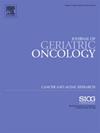Preliminary experience supporting older adults with breast cancer: Successes, challenges, and next steps for a program embedded in a breast oncology center
IF 3
3区 医学
Q3 GERIATRICS & GERONTOLOGY
引用次数: 0
Abstract
Introduction
Older adults diagnosed with cancer often have functional vulnerability and increased risk for treatment-related toxicity and poor outcomes, with emergent clinical strategies to mitigate these risks. The geriatric assessment (GA) is a widely recommended platform in the clinic to help inform treatment decisions and toxicity risk and initiate referrals, but incorporating the GA into busy clinical practice remains challenging.
Materials and Methods
To promote a consistent approach in conducting the GA and connecting older adults with relevant resources and services while acknowledging the specific care needs for those with breast cancer, our National Cancer Institute-designated center launched the Program for Older Adults with Breast Cancer (OABC) in May 2022, embedded within the Breast Oncology Center. The OABC coordinator offers approached patients an introduction to program services and an opportunity to undergo the GA. The coordinator uses the GA responses to facilitate appropriate geriatrics and supportive care referrals, with recommendations and utilization of services tracked in the program database. We report the initial findings from systematic GA administration within a high-volume breast cancer program.
Results
From 2022 to 2024, 362 patients were approached to enroll in OABC; 108 completed a GA. Overall, 32.1 % were aged 70–75 and 10 % were aged ≥86, and most (2/3) had non-metastatic disease. Approximately 30 % were hospitalized in the year before enrollment, 19 % had recent falls, and the majority reported having social supports for emotional and physical needs (>65 % for each). Based on the GA (n = 108), the most frequently recommended services were geriatrics (67 %) and social work (36 %). However, only 60 % of patients who completed the GA agreed to one or more referrals to any of the recommended supportive care services.
Discussion
OABC systematically reaches patients at high risk for aging-relevant needs. Coordination of services was successful, but patient declines for geriatrics and supportive resources referrals were common despite having dedicated program staff. Further efforts will increase uptake of the GA and these important services.
支持老年乳腺癌患者的初步经验:乳腺肿瘤中心项目的成功、挑战和下一步
诊断为癌症的老年人通常具有功能脆弱性,治疗相关毒性和不良预后的风险增加,需要紧急临床策略来减轻这些风险。老年评估(GA)是临床广泛推荐的平台,有助于告知治疗决策和毒性风险,并启动转诊,但将GA纳入繁忙的临床实践仍然具有挑战性。材料和方法为了促进实施GA的一致方法,并将老年人与相关资源和服务联系起来,同时承认乳腺癌患者的特殊护理需求,我们的国家癌症研究所指定中心于2022年5月启动了老年乳腺癌患者项目(OABC),该项目嵌入乳腺肿瘤中心。OABC协调员向接近的患者介绍项目服务并提供接受GA的机会。协调员使用GA的回复来促进适当的老年病学和支持性护理转诊,并在项目数据库中跟踪服务的建议和利用情况。我们报告在一个大容量乳腺癌项目中系统GA给药的初步发现。结果从2022年到2024年,362例患者被纳入OABC;108人完成GA。总体而言,32.1%的患者年龄在70-75岁之间,10%的患者年龄≥86岁,大多数(2/3)患者患有非转移性疾病。大约30%的人在入学前一年住院,19%的人最近跌倒,大多数人报告在情感和身体需求方面得到社会支持(各占65%)。根据GA (n = 108),最常推荐的服务是老年科(67%)和社会工作(36%)。然而,完成GA的患者中只有60%同意一次或多次转介到任何推荐的支持性护理服务。oabc系统地满足高危患者与老龄化相关的需求。服务的协调是成功的,但是尽管有专门的项目工作人员,老年病学和支持性资源转介的病人数量下降是常见的。进一步的努力将增加对全球总协定和这些重要服务的采用。
本文章由计算机程序翻译,如有差异,请以英文原文为准。
求助全文
约1分钟内获得全文
求助全文
来源期刊

Journal of geriatric oncology
ONCOLOGY-GERIATRICS & GERONTOLOGY
CiteScore
5.30
自引率
10.00%
发文量
379
审稿时长
80 days
期刊介绍:
The Journal of Geriatric Oncology is an international, multidisciplinary journal which is focused on advancing research in the treatment and survivorship issues of older adults with cancer, as well as literature relevant to education and policy development in geriatric oncology.
The journal welcomes the submission of manuscripts in the following categories:
• Original research articles
• Review articles
• Clinical trials
• Education and training articles
• Short communications
• Perspectives
• Meeting reports
• Letters to the Editor.
 求助内容:
求助内容: 应助结果提醒方式:
应助结果提醒方式:


